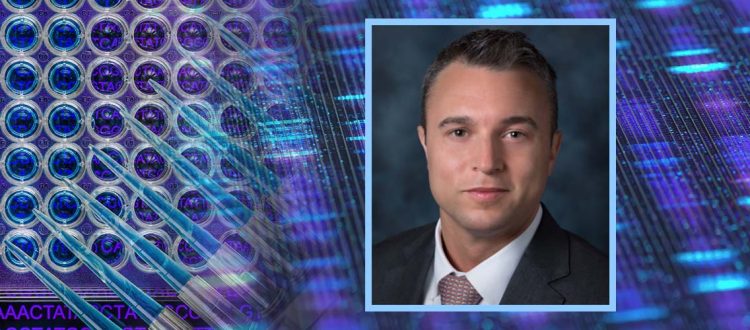AGA-Gastric Cancer Foundation Grantee Sam Klempner’s Research Boosts Understanding of Peritoneal Spread
When Samuel J. Klempner, M.D. received the $300,000 Ben Feinstein Memorial Research Scholar Award from the Gastric Cancer Foundation and the American Gastroenterology Association (AGA) in 2020, his goal was to probe causes and potential solutions to “peritoneal spread”—the migration of cancer cells into the lining of the abdomen. About 40% of patients experience this problem, which greatly lowers the odds of survival.
Klempner is excited about what he’s learned so far and enthusiastic about his research plan for the final year.
Klempner’s mission is to study the composition of the abdominal fluid in gastric cancer patients with peritoneal spread, which is called the ascites (uh-SY-tees), Specifically, he set out to characterize the immune components of ascites. Using ascites samples from 25 gastric cancer patients, his team analyzed single cell RNA sequencing data to determine what’s floating in the fluid—and to improve the understanding of how those components make defeating the cancer so difficult.
An early observation that the filtered ascites fluid helped tumor and immune cells survive led to an unanticipated direction toward studying the circulating factors in ascites. One area includes “exosomes” which are tiny vesicles that have been implicated in promoting tumor growth and driving resistance to some therapies, including immune therapies. The researchers found that exosomes are “very abundant” in ascites, Klempner said, and that they promote tumor cell invasion and blood vessel formation. “After exosomes are taken up by tumor cells, they give them information and growth signals to help them stay alive,” he said. “That’s probably one of the reasons ascites is difficult to treat.”
In another study, Klempner and his colleagues are examining about 70 different cytokine hormones that play a role in suppressing the ability of the immune system to fight cancer. The compared the level of those cytokines in blood to that of ascites. They discovered that several immune-related cytokines that are known to cause resistance to immunotherapy drugs were much more abundant in ascites than they were in blood, adding another mechanism by which peritoneal disease may be less immunotherapy sensitive.
Klempner’s research has been featured in two published studies in the last year, one in the Journal of Immunotherapy in Cancer and the other Cancer Discovery, the second of which was the result of a collaboration with researchers in Korea. A paper describing the exosome research is now under review for publication.
Klempner said the studies all contribute to a single story: “It starts to explain why all our therapies work poorly in patients with ascites,” he said. “Basically, there’s stuff in the soup that is promoting tumor growth and therapy resistance.”
In final year of the grant, Klempner’s goal is to identify the key cell types and cytokines and nominate top drug candidates and pathways for clinical trials in gastric cancer patients with peritoneal spread. He anticipates his data will point to novel combination strategies, pairing immune-boosting drugs with other medicines that can withstand the challenging ascites environment.
“It’s a fantastic time to be a GI researcher, with a lot of new drugs and targets,” Klempner said. “I’m so thankful to the Foundation for providing this funding that’s helping us to answer so many tough questions.”
The AGA–Gastric Cancer Foundation Ben Feinstein Memorial Research Scholar Award in Gastric Cancer provides $100,000 per year for three years to young scientists working towards careers in gastric and esophageal cancer research. Klempner is the third recipient of the award.

